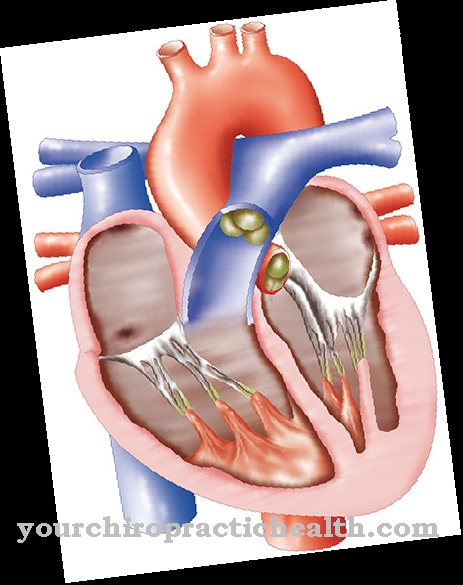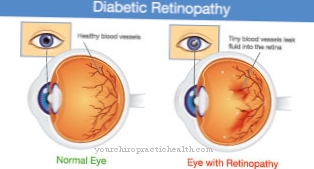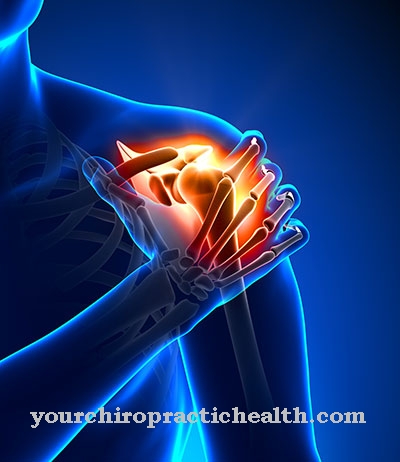The medic referred to as Hyper-IgD syndrome - also known as HIDS - a hereditary disease that is predominantly characterized by recurring attacks of fever. For this reason, the hyper-IgD syndrome is also one of the so-called periodic fever syndromes.
During the fever episodes, those affected complain of diarrhea, abdominal pain and also nausea and vomiting. There is no causal treatment; however, the prognosis - in terms of the patient's life expectancy - is good.
What is Hyper-IgD Syndrome?

© izholudeva - stock.adobe.com
The Hyper-IgD syndrome (or HIDS) is a hereditary disease. Recurring attacks of fever and gastrointestinal symptoms are characteristic. Periodic diseases, to which the hyper-IgD syndrome belongs, have been known since the 19th century, but were not redefined and shaped until 1948 by the physician Hobart A. Reimann.
In 1984 the hyper-IgD syndrome was mentioned for the first time. A Dutch working group described recurring fever in siblings as well as general inflammatory reactions as well as significantly increased immunoglobulin-D and immunoglobulin-A. Around 160 diagnoses have been made since 2001; the majority of those affected live in France and the Netherlands. However, it is believed that the number of unreported cases is higher.
causes
The hyper-IgD syndrome arises due to a change in genetic information - a so-called mutation. The mutation takes place on chromosome 12. Hyper-IgD syndrome inheritance is autosomal recessive. In around 80 percent of all cases, there is primarily a missense mutation in the gene area, which subsequently codes for the MVK (12q12, GeneID 4598 - enzyme mevalonate kinase). This mutation causes a slightly reduced stability of the activity of the enzyme.
So far, however, it is unclear why the reduced mevalonate kinase activity subsequently triggers flare-ups. Due to the unclear cause, there is also no known therapy which sometimes combats the cause. Doctors can therefore only perform symptomatic treatments that focus primarily on the fever attacks.
Symptoms, ailments & signs
Hyper-IgD syndrome occurs as early as the first year of life. Recurring attacks of fever are characteristic; the patient complains of rapidly developing fever and chills. The triggers for those fever attacks are minor injuries, vaccinations or even stress and operations.
In many cases, patients also complain of abdominal pain, nausea and vomiting, and diarrhea, among other things. Sometimes the cervical lymph nodes can also swell. Other symptoms that are characteristic of the hyper-IgD syndrome: headache, joint inflammation as well as joint pain and rashes.
The relapses themselves occur at intervals of between four and six weeks. The duration is between three and seven days. However, the duration and frequency of the relapses can vary significantly depending on the patient. Fever attacks occur more frequently, especially in childhood; in adulthood the frequency and intensity decrease.
Diagnosis & course of disease
If there are characteristic symptoms that suggest hyper-IgD syndrome, checking the immunoglobulin D concentration in the blood can provide information as to whether the hyper-IgD syndrome actually exists. If the concentration of immunoglobulin D is above 100 IU / ml, it can be assumed that a hyper-IgD syndrome is present. Molecular genetic evidence of an existing mutation can sometimes also provide information as to whether or not a hyper-IgD syndrome is present.
However, in order to secure the diagnosis, the doctor must rule out other diseases with similar symptoms in advance. The hyper-Ig-D syndrome is also one of the periodic fever syndromes; Familial Mediterranean fever (FMF) must also be ruled out in advance.
Other diseases that have a similar course and must be ruled out before the diagnosis of hyper-IgD syndrome are: the "tumor necrosis factor receptor 1-associated periodic syndrome" (also known as TRAPS), cyclic neutropenia, and chronic-infantile-neurological -cutaneous articular syndrome (or CINCA syndrome) and Muckle-Wells syndrome. It also includes diseases that fall under the PFAPA syndrome (periodic fever, canker sores, adenitis syndrome or pharyngitis).
Even if the treatment of hyper-IgD syndrome is relatively difficult, the prognosis is still good. Life expectancy is not limited, even if it is an extremely severe form of the syndrome. However, the joints can be attacked in the course of the attacks, so that joint destruction is possible.
Amyloidosis, such as in familial Mediterranean fever, has so far only been documented in isolated cases. In a few cases, neurological abnormalities and limitations in intellectual abilities were also documented. Epilepsy, coordination and balance disorders are also possible, but they also only occur rarely.
Complications
Due to the hyper-IgD syndrome, the person concerned suffers from severe attacks of fever, which recur after a certain time. It is not possible to predict the exact time of the next fever attack. In addition to the fever, the affected person also suffers from abdominal pain and diarrhea. Furthermore, there is also nausea and vomiting.
The quality of life is greatly reduced by the hyper-IgD syndrome and everyday life is made more difficult by the symptoms. As a rule, the patient's resilience is also reduced and the person concerned appears exhausted and tired. The fever attacks can also have a negative effect on the psyche and lead to depression or other upsets.
There is also pain in the head and joints. It is not uncommon for the skin to be affected by rashes and the lymph nodes to swell. As a rule, children in particular are affected by the frequent attacks of fever. The treatment of the hyper-IgD syndrome is symptomatic and limits the symptoms of the fever attack. There are no further complications. In most cases, the frequency decreases with age. Life expectancy is also not reduced by the hyper-IgD syndrome.
When should you go to the doctor?
In the case of hyper-IgD syndrome, severe symptoms suddenly appear after the first year of life that a doctor's consultation is always necessary. Since similar symptoms are also observed in other diseases, an urgent diagnostic clarification of the symptoms is necessary. This is the only way to initiate effective therapy. A visit to the doctor should take place, among other things, if the one-year-old child suddenly suffers from inexplicable attacks of fever, which can occur at longer intervals.
The fever is usually announced with the onset of chills. Above all, the doctor should also be consulted if there is a fever attack on special occasions such as vaccinations, stress or injuries. The symptoms accompanying the fever should already be used as an opportunity to seek medical help. These symptoms include swelling of the lymph nodes, severe abdominal pain, vomiting, and diarrhea.
If the doctor diagnoses hyper-IgD syndrome, he will discuss the necessary therapy with the parents. This consists of the administration of the cholesterol-lowering agent simvastatin and the immunosuppressant etanercept. With these drugs the symptoms are alleviated and at the same time the risk of rare complications such as joint contractures or adhesions in the abdomen are reduced. Since the disease does not usually affect life expectancy and the fever attacks become less and less common in the course of life, constant medical care is not necessary.
Doctors & therapists in your area
Therapy & Treatment
So far there is no therapy or treatment that primarily combats or treats the cause of the hyper-IgD syndrome. For this reason, doctors concentrate mainly on the symptomatic treatment of the recurring fever attacks. However, these treatments also turn out to be extremely difficult, because they not only differ from patient to patient, but can also have different intensities depending on the episode.
Classic antipyretic or anti-inflammatory drugs - such as non-steroidal anti-inflammatory drugs - are completely ineffective. Colchicine, steroids or thalidomide have also proven to be ineffective.However, medical professionals have recognized that simvastatin can help treat any flare-ups.
Some time ago, positive developments in the context of the "interleukin-1ra analogue anakinra" were also reported. Sometimes the “tumor necrosis factor-α antagonist etanercept” can lower the fever days and alleviate the intensity. No other treatments are currently known.
You can find your medication here
➔ Medicines for fever and chillsOutlook & forecast
Hyper-IgD syndrome offers a relatively positive prognosis. Although the disease is associated with severe symptoms such as gastrointestinal complaints, skin rashes, damage to the joints and fever, in the long term these health problems can be greatly reduced or even completely eliminated with comprehensive drug treatment.
Even if the joints are involved, the disease is not always associated with long-term symptoms, provided that early treatment is used. Only in isolated cases do permanent joint disorders occur, which permanently impair quality of life and well-being and thus harbor the risk of mental suffering. Amyloidosis, which can affect all organs and the endocrine system, only occurs in a few patients. However, some patients experience neurological disorders that can impair mental abilities and coordination. In severe cases, epilepsy can develop.
Most of the time, those affected can lead a pain-free life, which, however, is always associated with long-term drug treatment and physiotherapeutic measures. Sick people also have to undergo surgical interventions again and again or suffer from side effects and interactions as a result of the constant administration of drugs. Mental health problems can also occur in chronically ill HIDS patients. Typical psychological complications are inferiority complexes and depressive moods through to severe depression. Life expectancy is not reduced by hyper-IgD syndrome.
prevention
Due to the fact that Hyper-IgD syndrome is a hereditary disease, preventive measures are not known or possible.
Aftercare
The measures or options for follow-up care are usually very limited in the case of hyper-IgD syndrome. Since it is also a hereditary disease, a complete cure cannot be achieved. Those affected are therefore dependent on lifelong therapy and treatment in order to permanently alleviate the symptoms.
In order to avoid passing the Hyper-IgD-Syndrome on to the descendants, genetic counseling should also be given if the child wishes to have children. This is the only way to prevent the disease from being passed on. Since hyper-IgD syndrome is usually treated by taking medication, those affected should make sure that they are taken regularly and, above all, correctly.
Possible interactions should also be taken into account. If you have any questions or are unclear, you should always contact a doctor first. Since the hyper-IgD syndrome can also promote tumors, those affected should be examined regularly by a doctor. The support and care of friends and family is also very important and can alleviate the symptoms. Above all, psychological complaints or depression are prevented. The life expectancy of those affected may be reduced by the hyper-IgD syndrome.
You can do that yourself
Since the hyper-IgD syndrome unfortunately cannot be treated causally and therefore causally, only the individual symptoms and complaints can be restricted.
The fever attacks are treated with medication. General bed rest and taking care of your own body can also have a very positive effect on the course of the disease. Above all, those affected should not simply do physical activities. The use of antipyretic drugs or painkillers can also have a negative effect on the stomach, so that a doctor should be consulted.
Furthermore, contact with other affected persons can also be helpful in the case of hyper-IgD syndrome. This may make everyday life easier to cope with. The help of friends and acquaintances can also significantly reduce and alleviate the psychological symptoms of the syndrome. Unfortunately, those affected have to come to terms with the disease and must not forget that the fever attacks that occur only for a short period of time. However, treatment is still necessary for epileptic seizures. In particular, driving vehicles or operating heavy machinery should not be performed in epilepsy.



.jpg)
.jpg)

.jpg)






.jpg)

.jpg)
.jpg)











.jpg)